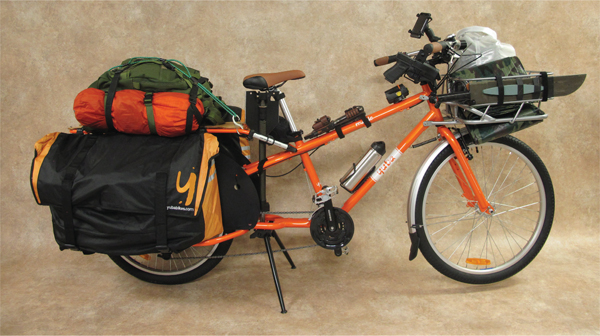

By Jackie Musser
It’s easy to imagine a scenario when traveling by bicycle would be more advantageous than traveling by car—fuel shortages, road closures and traffic jams, just to name a few. A back-up bike can help you quickly and safely get from point A to point B. Like all survival gear, a back-up bike needs to be packed and prepared at all times so it’s ready for use at a moment’s notice. This guide will help you select and equip a bike strong enough to get you through an emergency.
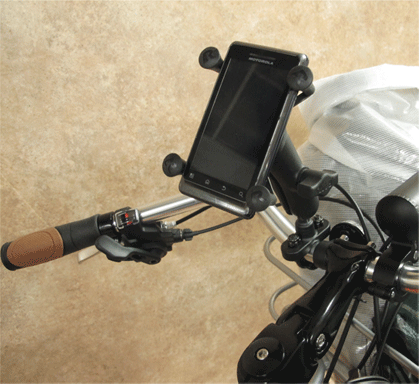
Smartphone Handlebar Mount Even if the grid is down, it’s still a great idea to carry a cell phone. You may make it to an area with cell service, in which case you can use your smartphone for navigation, communications and information. This cell phone mount is from Ram Mounts (rammount.com).
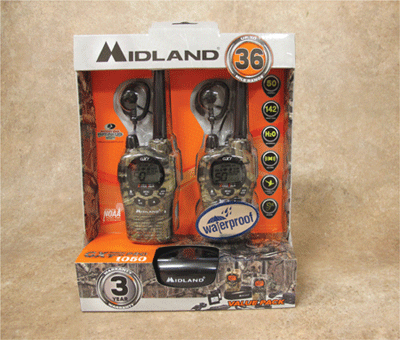
2-Way Radio or Handheld CB Radio This is an excellent backup that will work even if the grid is down. This set is from midlandusa.com.
Whether you are using your back-up bike in an evacuation or as temporary transportation during a public transit shut down or fuel shortage, you need a bike that can cover a lot of ground in a short amount of time.
Kelly Sullivan, owner of Bishop’s Bicycles in Milford, Ohio, recommends the Allegro X Sport by Jamis Bicycles (jamisbikes.com). “It’s an awesome bike for the person who needs solid transportation under unknown conditions,” he says.
What makes it so awesome? The wheels are 700c, the same wheel diameter as a road bike, and bigger wheels mean more speed. The double-wall rims will support the extra weight of your gear, and the disc brakes give you the extra stopping power you need when carrying a heavy load. It has a front shock in case you need to hop a curb or go off road. You can add a rack system to the back to hold your gear, and it sets the rider upright.
“By sitting up a little higher, you have a really good sightline of your surroundings—traffic, pedestrians, potholes,” says Sullivan.
Mountain bikes seem like a rugged, logical choice for a back-up bike, but if you plan to travel on roads you may want to think again. “A mountain bike tire has a lug pattern that makes it great for riding off-road in the dirt, but makes it cumbersome to ride on the pavement,” Sullivan says. If you need to cover a lot of ground fast, he recommends finding a bike that performs well on pavement but has some off-road capabilities as well. “You want a quality bike that is dependable that you can pedal for who knows how many days and how far,” he adds.
A bike trailer can also give you more room to haul gear. For everyday use and the recreational rider Sullivan recommends an aluminum trailer like those made by Aveniur (avenirusa.com). For super-duty use he recommends B.O.B trailers (bobgear.com).
If you’re looking to carry a lot of extra gear or even another person (or two), you may want to consider a cargo bike. This is the approach survival expert Creek Stewart, author of Build the Perfect Bug Out Bag, has taken with his back-up bike.
“I wanted a bike that could handle more cargo than just my bug-out bag,” Stewart says. “I wanted the option to pack extra water, survival tools and even food. Traditional bikes just are not designed for this. I tried but was never happy with the results.”
Stewart has outfitted a Mundo by Yuba Bicycles, (yubabikes.com), as his back-up bike. With the front cargo basket, integrated rear rack, and side-loaders, there’s plenty of room for survival equipment. You can also customize the bike and add an additional adult passenger seat or up to two child seats.
The Mundo’s large stainless steel cargo frame is designed to balance and distribute large amounts of weight. Though the bike alone weighs in at nearly 50 pounds, Stewart says he has easily peddled the bike with an additional 300 pounds of weight on it. The bike has 21 speeds making it easier to shift gears and haul big loads.
Stewart’s favorite part about the bike is that the frame is electric conversion ready, and Yuba sells an electric motor that can be installed on it. “For those worried about hauling the extra cargo, the electric motor option takes the work out of hills and long treks,” Stewart says.

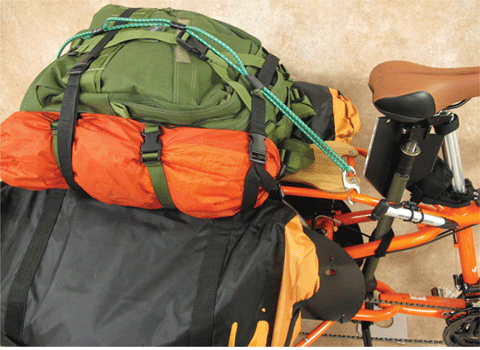
Durable Storage Panniers Waterproof panniers offer even more protection for your gear. There’s a wide price range for panniers. For the budget-conscious, Sullivan recommends panniers by Axiom Performance Gear (axiomgear.com). For high-end panniers, he recommends Arkel brand (arkel-od.com). The panniers pictured are from Yuba Bicycles (yubabikes.com).
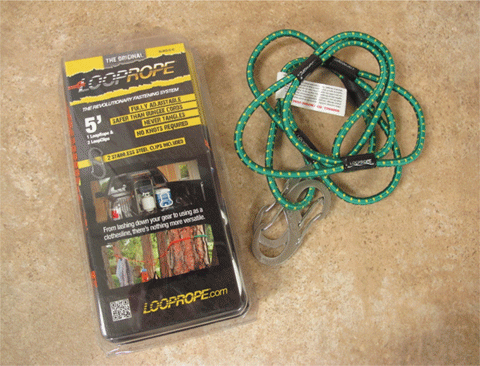
Bug-Out Bag This bag is strapped to the cargo area using straps from looprope.com. Your bug-out bag will include most of the supplies you need for your journey.
Bulk water storage Take advantage of your bike’s extra-hauling capabilities and carry extra water with you. A six-gallon water tote is stored in one of the cargo panniers.
Water bottle with frame mounted storage Try a set from Klean Kanteen (kleankanteen.com). Use a bottle that is all metal so it can be used to boil water should the need arise.
Tent and Ground Pad Strapped to cargo area (if this isn’t already in your bug-out bag). You can find straps at looprope.com.
Extra clothing in dry bag SealLine brand carries waterproof dry bags.
Case of MREs Again, take advantage of the extra space and stow extra food in the cargo panniers. Find MREs on MRE-meals.net.
Bicycle Tire Pump
Front-mounted headlamp Try the Defender Bike Light from Gotham Bicycle Defense Industries (bikegotham.com). It’s specifically designed to be theft resistant. “The technology and quality of lights have come up and the new technology has brought the price down,” Sullivan says. He recommends the urban 550 headlight and VIS 180 taillight, both from Light and Motion (lightandmotion.com). Both use a lithium-ion cell battery than can be charged using a USB cable or solar attachment.
Survival Knife and Sheath Strapped to frame for easy access.
Paracord Have 100-feet wrapped around frame for easy storage.
SLIME Tire Sealant Tire-Patch Kit and Universal Bicycle Multi-Tool In an easy-access under-the-seat storage case.
Machete Strapped to Bike Frame Most useful for clearing debris from your path, but can also be used for self- defense, and looks intimidating. The Smith & Wesson Guide Master Machete is reputable.
Camouflaged-colored tarp
Bolt Cutters This handy tool will let you navigate through fences or gates.
4' × 12' Seine Net This is a multifunctional piece of gear that can be used as a hammock, a seine for gathering fish and a makeshift ghillie tarp if you add leaves, sticks and grasses to it.
Crovel Survival Shovel This multipurpose tool is great for digging, chopping, hammering, prying and even self-defense. It’s available from gearupcenter.com.
Take-Down Recurve Bow With 3 three-piece take-down arrows stored in pannier storage bags. Perfect for hunting. You don’t have to worry about running out of ammo, and the silent arrows won’t draw unwanted attention.
Self-Defense Pepper Spray Use a Wall Mount Hub for the pepper spray, Tornado 5-in-1 (gettornado.com). It includes a built-in alarm and strobe light.
Ram Hand Gun Holster Handlebar Mount Available from rammount.com.
Hand gun With extra magazines and ammo.
Cable bike lock
Your back-up bike needs to be ready at a moment’s notice, so regular maintenance is a must. And when you are riding in unknown conditions or for an unknown length of time you need to be prepared for any potential problems. Sullivan says there are three things all cyclists should do to keep their bikes on the road and avoid potential maintenance issues:
Jackie Musser is the Senior Content Producer for Living Ready.